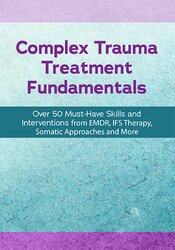
×

When you treat clients with complex trauma there are so many intricacies. From diverse histories and ranges of responses to attachment issues, co-occurring disorders and dissociation, no two clients are exactly alike.
With so much complexity you can quicky find yourself in uncharted territory. But theory and overviews just aren’t enough, you need practical “do this” guidance to navigate this labyrinth.
I know. I used to have the same struggles. Now as trainer and consultant specializing in complex trauma, I help therapists like you overcome the challenges that can steal your confidence and stall your treatment plans.
And now, in this one-day training I’ll provide you the keys to unlocking a new level of confidence and competency in this critical area of therapy.
When you join me, you’ll get the solid foundation you need to work with complex trauma clients, ready to not just understand today’s most in-demand therapies like IFS therapy, EMDR, and somatic approaches but actually put strategies from them into practice with your clients right away.
In just one day I’ll provide you with detailed instruction, step-by-step guides, and case studies that will make it easy for you to:
Don’t miss this chance to walk away with a set of actionable strategies you can immediately apply in your practice.
Register now!
All members of the PESI, Inc. planning committee have provided disclosures of financial relationships with ineligible organizations and any relevant non-financial relationships prior to planning content for this activity. None of the committee members had relevant financial relationships with ineligible companies or other potentially biasing relationships to disclose to learners. For speaker disclosures, please see the faculty biography.
Continuing education credit information is coming soon for this live webcast.

Jennifer Sluga, LPC, SAC, is an EMDRIA consultant who owns Trauma Life Consulting, where she is a therapist, trainer, consultant specializing in complex trauma. For years, Jennifer has worked with survivors of trauma, helping them heal through therapy and support. Additionally, she dedicates time to training clinicians, community members and advocates on issues related to sexual violence and military trauma. This includes effective treatment practices, principles of trauma-informed survivor-centered care, the impact of trauma on survivors and systems, and social/cultural issues in sexual assault/military trauma treatment and advocacy. She is devoted to helping people to resolve old, unhealthy patterns of thinking and behaving that prevent them from reaching their full potential. As a result of this solution-focused approach, clients report feeling more empowered to make more mindful and positive decisions about the direction of their life.
Speakers Disclosures
Financial: Jennifer Sluga maintains a private practice. She receives a speaking honorarium from PESI, Inc. She has no relevant financial relationships with ineligible organizations.
Non-financial: Jennifer Sluga has no relevant non-financial relationships.
|
Complex Trauma Fundamentals: Over 50 Must-Have Skills and Interventions from EMDR, IFS Therapy, Somatic Approaches and More
Thu, Jan 09, 2025 - 08:00am to 04:00pm EST - Product Code LWC059788 |
Please note: There will be a 70-minute lunch and two 15-minute breaks; one in the morning and one in the afternoon. Lunch and break times will be announced by the speaker and at their discretion. A more detailed schedule is available upon request.
For live CE credit, you must watch the live webcast in its entirety at its scheduled time and complete the CE quiz and evaluation within one week. You will have access for 90 days after the program for review.
Visit our FAQ page at https://www.pesicanada.ca/faq or contact us at https://www.pesicanada.ca/contact-us.
Complex Trauma Essentials: Brain Body Science Simplified
Complex Trauma Assessment and Diagnosis
Attachment and Relationship Repair in Trauma Recovery: The Foundation for Effective Treatment
Go-To Trauma Stabilization Techniques All Therapists Need
Trauma Narrative and Processing: Top Skills and Strategies to Help Clients Make Sense of Their Trauma
Integrate IFS Therapy, EMDR, and Somatic Techniques into Your Sessions
Satisfaction Guarantee
Your satisfaction is our goal and our guarantee. Concerns should be addressed to info@pesicanada.com.
Please wait ...